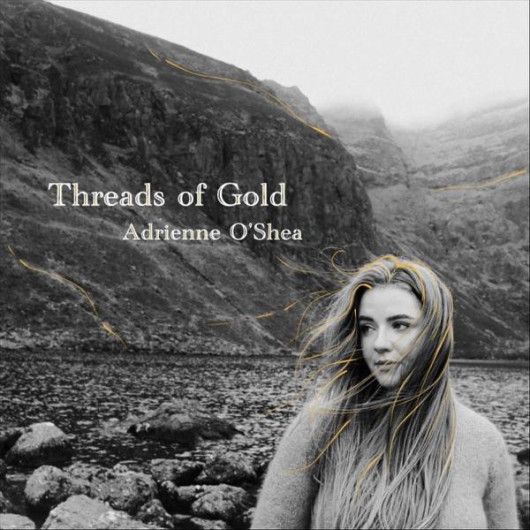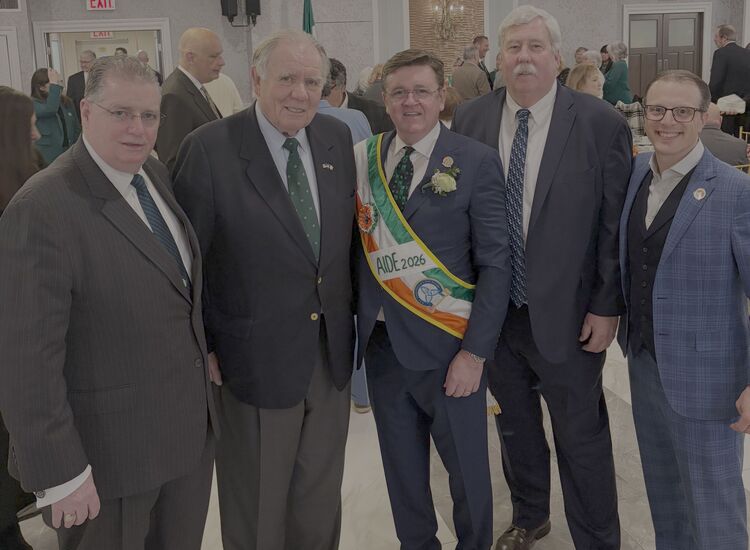Folks, in the media player this week is “Threads of Gold,” the debut album from Adrienne O’Shea. O’Shea is based in St. Paul, Minn., and has been there for much of her life, but she was born in Dublin to a family she reports was “steeped in Irish culture,” and it shows. This is a very high quality and quite mature sounding album from a young singer that I think fans of traditional music, and traditional song in particular, should pay close attention to.
The list of musicians that contribute here is intriguing. O’Shea, of course, features as vocalist, but she also plays flute and whistle here with great effect. She’s joined by a really interesting crew, including Brian Miller (guitar and bouzouki), Dáithí Sproule (guitar and vocals), Danny Diamond (fiddle), Cormac Ó Sé (accordion), and Norah Rendell (vocal harmonies), all of whom are musicians with high reputations and stellar track records, within and apart from the thriving world of traditional music in Minnesota.
But what I find particularly fascinating – even before I hit play on the player – is that Miller and Sproule assisted with the arranging duties. Many readers will know Sproule from his work with Skara Brae, Trian, and especially the supergroup Altan, and Miller from his work with the group Bua, as well as with his own projects, including “Minnesota Lumberjack Songs,” “The Falling of the Pine” (with Randy Gosa), and “Let Fly” (with Danny Diamond, who plays here, is a fantastic fiddle player, and recorded “Cold Old Fire,” the first album by Lankum, back when they went by the name Lynched). That these two invested so heavily in this project I think speaks volumes about O’Shea’s – and this album’s – potential. What was it that I was going to hear, here?
The answer, I found, is something special. To start, O’Shea has a wonderful voice. It’s crystal-clear, her phrasing is quite skillful, and she conveys each song’s meaning with excellence. She’s a very compelling singer. But as much as I like her voice, I admire her careful song selection. It would be very easy to rest on a more mainstream selection of material, but this isn’t what O’Shea’s done here. Rather, she’s curated material that moves, challenges, and reveals a singer who would seem to revel in the stories behind the songs as much as she does the songs themselves.
Complementing O’Shea’s outstanding voice are arrangements that she’s worked on with Miller and Sproule. They’re extremely tasteful and sophisticated, each having a very “organic” feel, which I feel suits her voice well. Each arrangement stands quite well on its own with no obvious studio craft to obscure artistic shortcomings. As you would expect from the musicians involved, there’s really no need for it, with the result being setting that are perfect vehicles for O’Shea’s voice.
The album starts with “Lady Diamond,” a bracing Child Ballad based on the story of Ghismonda and Guiscardo in Boccaccio’s “Decameron.” O’Shea takes the material and really makes it her own, conveying the plaintive quality of the material in how she sings. I love this track – it’s a brilliant way to start and perhaps my favorite on the album.
But there are many others that stand out as well, including “Black Eyed Susan,” an English ballad collected in the Appalachians about the farewell between a man leaving to fight in the Napoleonic Wars and his lover. O’Shea is once again marvelous here, as is the arrangement which articulates the poetry contained in the song well. “Willie Taylor” is another that draws my ear. The instrumental backing gives this one a sense of adventure and anticipation, but the song itself, about love and retribution, is as interesting as O’Shea’s rendering.
There are still more to speak well of. She’s done a lovely version of “Barbara Allen” (taken from the singing of Jean Ritchie) which is absolutely worth hearing, and one of “The House Carpenter,” another Child ballad rooted in the 17th century, about fidelity and choice. Unlike other versions, the version she’s performing here has a new ending that changes the song’s theme in a quite interesting and most welcome way that I think listeners will respond to well.
“Threads of Gold” is a stellar debut from a bold young singer I hope to hear more from in the future. O’Shea’s singing is superb, as is the music that accompanies it. If your tastes include singers like Karan Casey, Cathy Jordan, and Nuala Kennedy, or Anaïs Mitchell (and I think specifically of the Child Ballads album she did with Jefferson Hamer), or groups like the Murphy Beds or even Lankum, this is an album for you. An artist to pay attention to for sure and definitely an album to check out, which you can do by visiting O’Shea’s Bandcamp page here.









